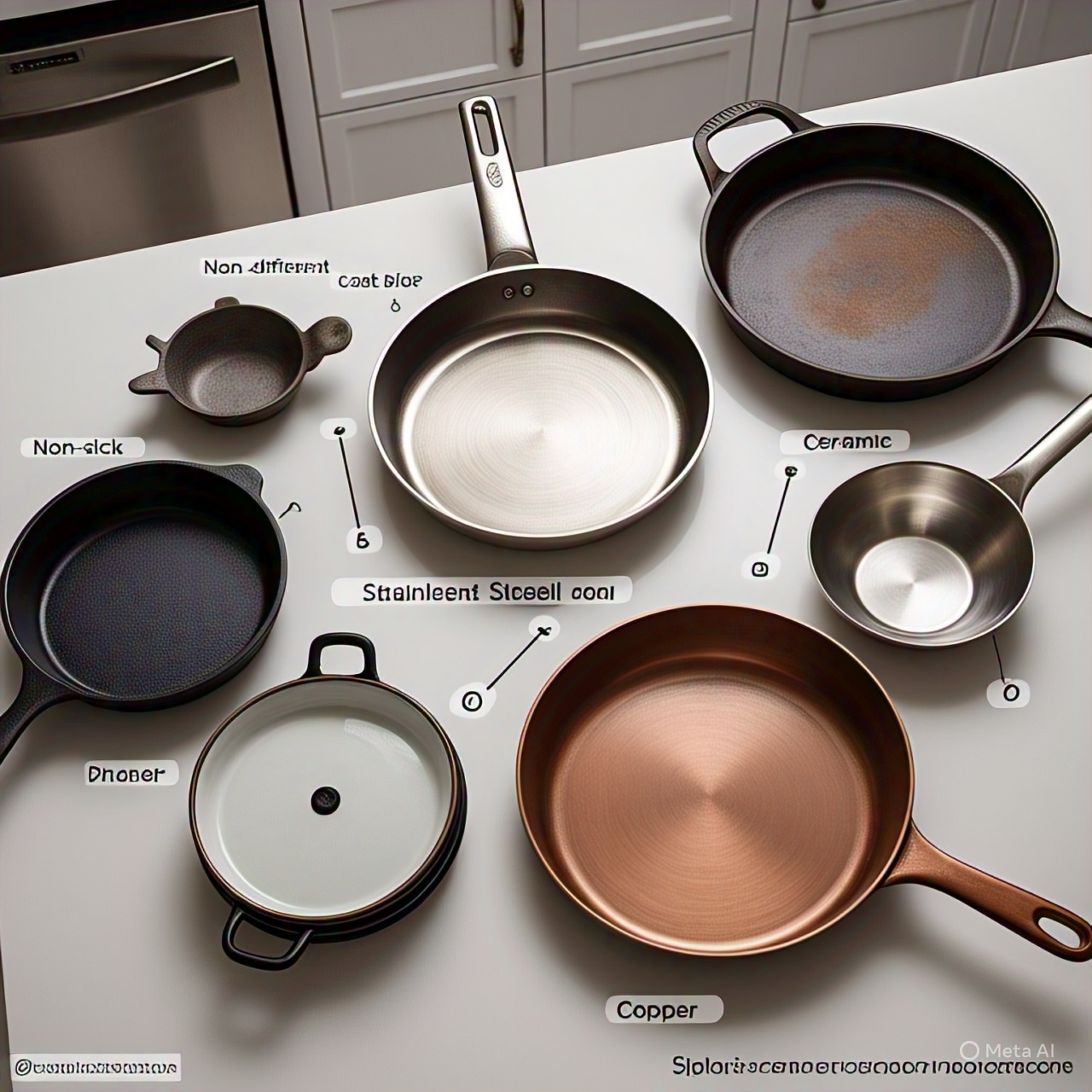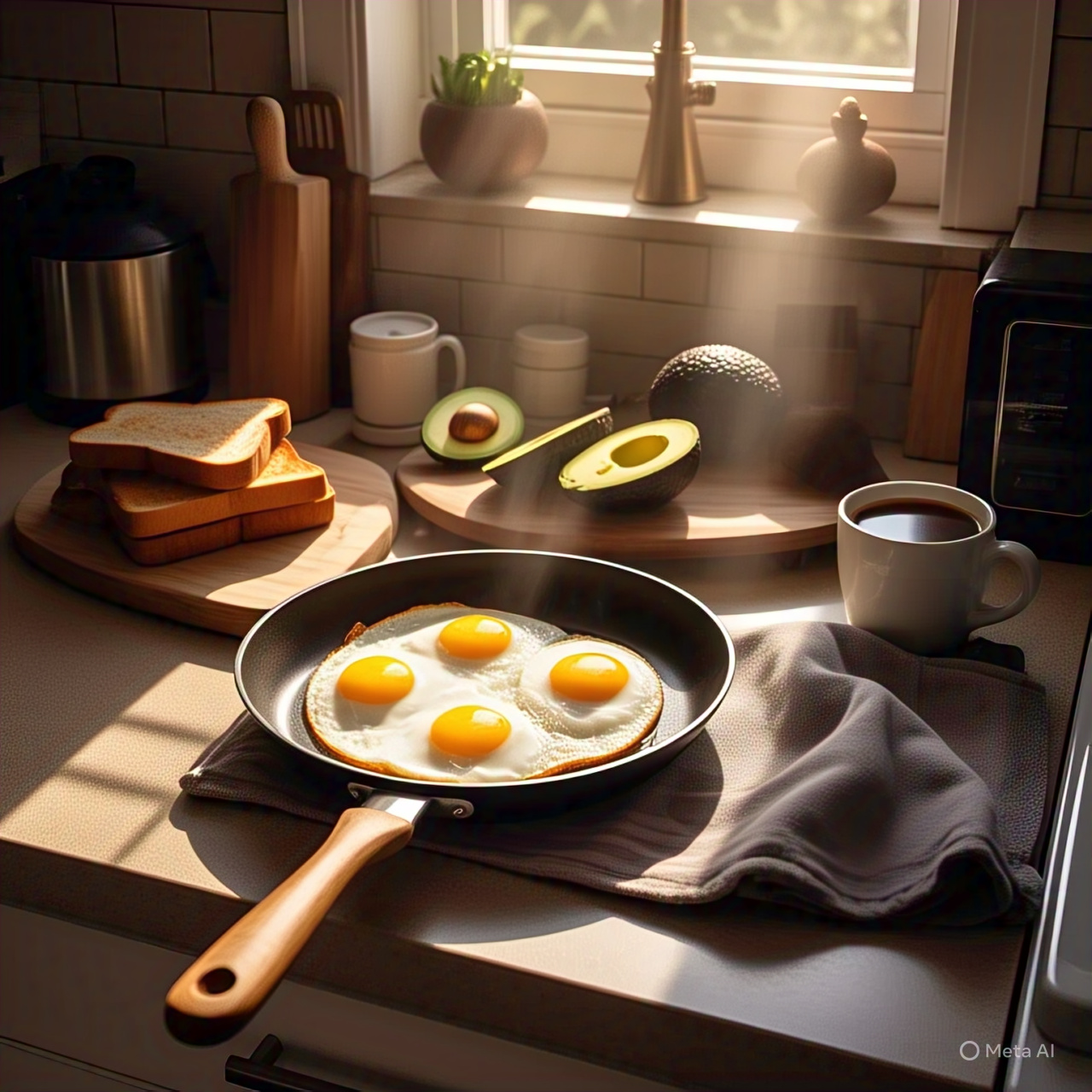The first step in frying the Best Pan to Cook Eggs is using the right pan. Whatever kind of egg you prefer—scrambled, poached, or sunny-side-up—the pan you choose may make a big difference. Here you will find detailed information on selecting the ideal pan for frying eggs, including the various types of pans, important features to look for, top recommendations, and expert tips.
✅ The Importance of Using the Right Pan for Eggs
-
Eggs must be cooked uniformly due to their fragility.
-
If you use the wrong pan, you run the risk of sticking, uneven cooking, or cracked eggs.
-
For the best texture and taste, choose a nonstick pan with a smooth surface.
-
You can make restaurant-quality eggs in your own kitchen with the correct pan.
🍳 Methods Commonly Used for Cooking Eggs (Along with the Pan Needed)
-
Low heat and a nonstick surface are necessary for scrambling eggs.
-
Flat surfaces with shallow sides make flipping fried eggs much simpler.
-
Although poached eggs aren’t pan-specific, they do best in shallow, wide pans.
-
In order to cook properly, omelets need room to fold and a uniform application of heat.
-
To boil water evenly for eggs, use deep pans.
🛠️ What Makes the Best Pan for Cooking Eggs?
-
For easy cleaning and no sticking, a non-stick coating is a must-have.
-
Maintains Consistent Cooking Temperatures: Avoids Undercooking and Burning.
-
Eight to ten inches is the perfect size for most egg recipes.
-
Handle Comfort: Stay-cool handles provide a safer and more ergonomic alternative.
-
Type of Material: Ceramic, stainless steel, cast iron, and aluminum all have their own set of benefits.
-
Option that may be used in the oven: Perfect for finishing omelets or frittatas in the oven.
-
Enables easy cleaning: Safe to use in the dishwasher.
🧪 A Variety of Pans for Cooking Eggs
1. Non-Stick Pan
-
If you fried eggs every day, you need a non-stick pan.
-
Cleaning it is a breeze, and it won’t cling.
-
Intense heat is not ideal for this.
-
Suitable for beginners abound.
2. Stainless Steel Pans
-
Stainless steel pans that are sturdy and built to last.
-
Like to be kept from sticking by using butter or oil.
-
Exceptional thermal insulation.
-
When frying eggs, there is a little learning curve.
3. Cast Iron Skillets
-
Skillets crafted from cast iron have superior heat retention properties.
-
It becomes inherently non-stick after being properly seasoned.
-
Heavy and may be too much for beginners to handle.
-
Perfect with fried or baked eggs.
4. Ceramic-Coated Pans
-
In place of traditional non-stick pans that include PTFE and PFOA, you may get ceramic-coated pans.
-
Secure and ecologically benign.
-
Easier on eggs but not as strong.
-
There are lively and appealing options out there.
5. Copper Pans
-
Pans constructed from copper have exceptional heat conductivity.
-
Lightweight and stylish.
-
Regular maintenance is necessary to maintain its luster.
-
Zinc or stainless steel is a common lining material.
🥇 Top 5 Pans to Fry Eggs
1. T-fal E93808 Nonstick Fry Pan
-
With a thermo-spot signal for preheating is a top pick.
-
Affordable and long-lasting.
-
Surface made of non-stick PTFE.
-
Savory and perfect for fried and scrambled eggs.
2. All-Clad D3 Stainless Steel Frying Pan
-
Frying pan made of professional-grade All-Clad D3 stainless steel.
-
Structure with three plies of bonded roofing material.
-
Perfect for use in the oven and dishwasher.
-
Perfect for cooks with expertise.
3. Lodge 8-inch Cast-Iron Pancake Pan
-
All set and prepared for usage.
-
Excellent for use in high-temperature cooking.
-
Quite versatile and oven-safe.
-
Stands the test of time.
4. GreenPan Rio Ceramic Non-Stick Pan
-
Thermolon ceramic cover.
-
No toxins and very light.
-
Stay-cool grip with a gentle feel.
-
An ecologically conscious option for egg lovers.
5. Cuisinart Chef’s Traditional Nonstick Skillet
-
The aluminum construction allows for quick heating.
-
Durable, nonstick surface inside.
-
Highly recommended for use on all stovetops (except induction).
-
Really cost-effective.
🧼 How to Maintain a Clean Egg Pan
-
Avoid using metal utensils so the non-stick coating stays intact.
-
To clean, use a delicate sponge and a light detergent.
-
Stay away from cooking sprays if you have non-stick surfaces.
-
For safe storage, use pan covers when stacking.
-
Season cast iron on a regular basis.
👨🍳 Advice from Experts on How to Cook Eggs Like a Chef
-
Turn the stovetop burner down to medium-low heat.
-
Spread the butter or oil evenly over the surface.
-
Do not overfill the pan.
-
Refrain from stirring or turning the eggs until they have set.
-
Throw on a lid to steam or over-cook your eggs.
-
Wipe out the pan as soon as the food has cooked through.
🧭 How to Determine Which Egg Cooking Pan Will Meet Your Needs
-
Every day, for scrambled eggs → Opt for a nonstick aluminum pan.
-
Gourmet omelets are easier to regulate when cooked in a ceramic or stainless steel pan.
-
When it comes to outdoor cooking or using a campfire, cast iron is your best bet.
-
Choose ceramic-coated items if you’re concerned about the environment.
-
When you’re cooking for a big group, it’s best to use pans with a deeper base, like 10 or 12 inches.
🛒 Essential Accessories for Egg Cooking
-
Silicone spatulas are gentle on non-stick surfaces and an additional tool for cooking eggs.
-
Fried egg rings work well with round eggs.
-
Cooking and steaming are both made easier with lids.
-
Use tongs to grasp shells or turn over eggs in the pan.
-
When making salads and sandwiches, egg slicers are a lifesaver.
💲 What May Be Expected in Terms of Price Analysis?
-
For little pans that don’t stick, spend ten to twenty dollars.
-
Ceramic, high-quality materials, extended lifespan, priced between $25 and $60.
-
Expensive: $70 to $150+ for name-brand cookware, including cast-iron and stainless steel options.
-
Buying the best pan for frying eggs is an investment that will pay off every morning!

🌱 Long-Term and Environmentally Conscious Pan Options
-
Choose reusable cooking utensils.
-
You may help the environment by avoiding non-stick cookware that is coated with PTFE and PFOA.
-
Select businesses who use packaging that is safe for the environment.
-
Cast iron is one of the greenest options since it lasts forever.
-
Choose low-energy cookware to save down on cooking costs.
🛍️ The Best Place to Find an Egg Cooking Pan
-
Shop from a wide variety of products with the help of customer reviews on Amazon.
-
You may get moderately priced and easily accessible brands at Target and Walmart.
-
Specialty shops are the best places to get professional-grade cookware.
-
Online stores: For genuine products, guarantees, and customer service.
-
Shop around at local cookware stores to get a feel for the pans before you buy them.
❓ Commonly Asked Questions: Discover the Solutions to Your Conundrums
Would stainless steel pans be suitable for boiling eggs?
Sure, but be sure to use the correct heating and oiling techniques to keep anything from sticking.
Can I safely use high heat on cookware that doesn’t have a stick?
Most people don’t. Always refer to the instructions provided by the manufacturer.
When is the best time to get a new non-stick egg pan?
Every one to three years, depending on the quality and usage.
Do you think ceramic non-stick surfaces are better than the more traditional kind?
It is easier on the environment and doesn’t include any harmful substances, but it isn’t as strong.
🌟 True Testimonials from Users
“The T-fal non-stick is the best pan to cook eggs I’ve ever used—nothing sticks!”
– Samira, the Home Cook
“The use of cast iron has revolutionized my method of frying eggs outside. Heavy but unbeatable.”
– The camper Rick
“I adore using my GreenPan. Not only is it non-toxic and silky smooth, but eggs just fall off.”
– Vegan foodie Jenna
🏁 Final Thoughts: Elevate Your Morning Routine
-
In addition to being non-stick, the pan should be durable, safe, and efficient.
-
Your choice should reflect your cooking style, personal preferences, and level of comfort with upkeep.
-
Having the right pan will make cooking eggs a daily ritual that you’ll look forward to.
✅ Review: The Best Pans for Cooking Eggs
-
8–10 inch size
-
Seasoned or non-stick cast iron
-
Eliminating mess is easy
-
Heat distribution that is fair
-
The grip is easy on the hand
-
Durable and strong
-
Harmonizes with the way you prepare food
-
Worth the price
